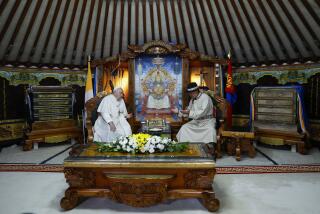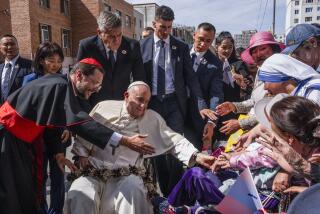Pope Treads Lightly in Muslim Indonesia : Catholic Minority Is Loyal to Homeland, He Assures Leaders
JAKARTA, Indonesia — Treading lightly in the world’s most populous Muslim country, Pope John Paul II on Monday assured Indonesian leaders of the loyalty of their country’s Roman Catholic minority.
“We must be fully Catholic and fully Indonesian,” the Pope said at an Indonesian-language Mass that opened a six-day visit to Indonesia, a country of 13,700 islands and 175 million people.
John Paul II, on the third day of his 44th foreign trip, flew to Jakarta after a weekend stop in Seoul, where he addressed a religious congress.
In an authoritarian country that is a frequent target of international human rights groups, the Pope’s message here was that Indonesia’s 5 million Catholics represent no threat.
“Jesus acknowledges a distinction, but not a separation, between the kingdom of God which he preached and the earthly realm to which all belong as citizens of their country,” the Pope said.
“It is precisely when we recognize the moral obligation to love our neighbor--all our neighbors, all our fellow citizens--that we acknowledge and fulfill our duties to the state and to those responsible for public life.”
The Pope was just as careful in broaching the subject of human rights in his encounter with Indonesian President Suharto, a former army general reelected last year to a fifth five-year term.
“At times,” he said, “nations are tempted to disregard fundamental human rights in a misguided search for political unity based on military or economic power alone. But such unity can easily be dissolved.”
‘Inalienable Rights’
In Indonesia, he said, “national tradition teaches” that the surest base for nation-building “is a profound respect for human life, for the inalienable rights of the human person and for the freedom of responsible citizens to determine their destiny as a people.”
In response, Suharto told the Pope that the practical responsibility of all religious groups in Indonesia is “to lay down, continuously and jointly, strong moral, ethical and spiritual foundations for our national development.”
The Suharto government, human rights groups say, is quick to muzzle dissent.
The Indonesia visit extends an unprecedented papal initiative toward the Muslim world that is an attempt to mute a millennium of hostility between the two religions. Last month, John Paul II issued a formal appeal to Muslims around the world asking their help in forging peace between Muslims and Christians in tortured Lebanon.
More than 80% of Indonesians are Muslim. Christianity is one of four other officially recognized religions in this agricultural, oil-rich and assertively nonaligned Third World nation.
Despite official tolerance, Indonesia’s Christians, most of them Protestants, do not have it easy. “Muslims continuously and in various ways try to thwart the development of Christianity,” Indonesian bishops said in a recent report to the Vatican.
To assuage fundamentalists among Indonesian Muslims--who are as disturbing to the technocratic government as they are to the Pope’s bishops--John Paul II’s stay is officially regarded as a state visit. He comes not as a church leader but as head of the Vatican state.
On Thursday, the Pope will makes his most sensitive stop in Indonesia--this one pastoral--when he visits the overwhelmingly Catholic Portuguese possession of East Timor. Forcibly annexed by Indonesia in 1976, East Timor has been the scene of widespread bloodshed, hunger and a lingering war between Timor separatists and the Indonesian army.
“I am not going to East Timor to visit a political entity but to visit a church,” the Pope told reporters on his flight to Seoul. “I can’t change the situation in which the church finds itself. Not to go would be an offense to that church.”
Neither the Vatican nor the United Nations recognizes the annexation. Earlier this year, the Catholic bishop in East Timor formally asked U.N. support for a referendum that would allow the people of East Timor to decide if they want independence.
Amnesty International (the London-based human rights group), U.N. investigators and the European Parliament have criticized the Suharto government for rights violations in East Timor.
More to Read
Sign up for Essential California
The most important California stories and recommendations in your inbox every morning.
You may occasionally receive promotional content from the Los Angeles Times.










